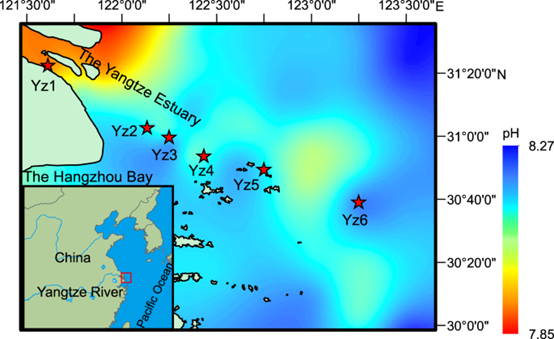河口近岸水体酸化对硝化过程及副产物氧化亚氮排放的影响
Effects of acidification on nitrification and associated nitrous oxide emission in estuarine and coastal waters
作者:Jie Zhou, Yanling Zheng, Lijun Hou, Zhirui An, Feiyang Chen, Bolin Liu, Li Wu, Lin Qi, Hongpo Dong, Ping Han, Guoyu Yin, Xia Liang, Yi Yang, Xiaofei Li, Dengzhou Gao, Ye Li, Zhanfei Liu, Richard Bellerby, Min Liu
期刊:Nature Communications
In the context of an increasing atmospheric carbon dioxide (CO2) level, acidification of estuarine and coastal waters is greatly exacerbated by land-derived nutrient inputs, coastal upwelling, and complex biogeochemical processes. A deeper understanding of how nitrifiers respond to intensifying acidification is thus crucial to predict the response of estuarine and coastal ecosystems and their contribution to global climate change. Here, we show that acidification can significantly decrease nitrification rate but stimulate generation of byproduct nitrous oxide (N2O) in estuarine and coastal waters. By varying CO2 concentration and pH independently, an expected beneficial effect of elevated CO2 on activity of nitrifiers (“CO2-fertilization”effect) is excluded under acidification. Metatranscriptome data further demonstrate that nitrifiers could significantly up-regulate gene expressions associated with intracellular pH homeostasis to cope with acidification stress. This study highlights the molecular underpinnings of acidification effects on nitrification and associated greenhouse gas N2O emission, and helps predict the response and evolution of estuarine and coastal ecosystems under climate change and human activities.

Fig.1 Study area and sampling locations overlaid on pH values of near-bottom water. Stations are marked by red stars.
随着大气二氧化碳(CO2)浓度不断上升,陆源营养盐输入、海岸上升流和复杂生物地球化学过程大大加速了河口近岸水体酸化。因此,更深入地了解硝化微生物对加速酸化的反应机理,对于预测河口海岸生态系统的响应及其对全球气候变化的作用至关重要。该研究表明,酸化可以显著抑制硝化速率,但也会促进河口近岸水体中副产物氧化亚氮(N2O)的生成。研究通过分别改变CO2浓度和pH值,排除了酸化条件下CO2升高对硝化微生物活性的有益影响(“CO2施肥”效应)。宏转录组数据进一步表明,硝化微生物会显著促进与胞内pH平衡相关的基因表达以应对水体酸化的胁迫。该研究强调了水体酸化对硝化过程及相关温室气体氧化亚氮(N2O)排放的分子基础,有助于预测气候变化和人类活动下河口海岸生态系统的反应与演变。
点击阅览文章全文








